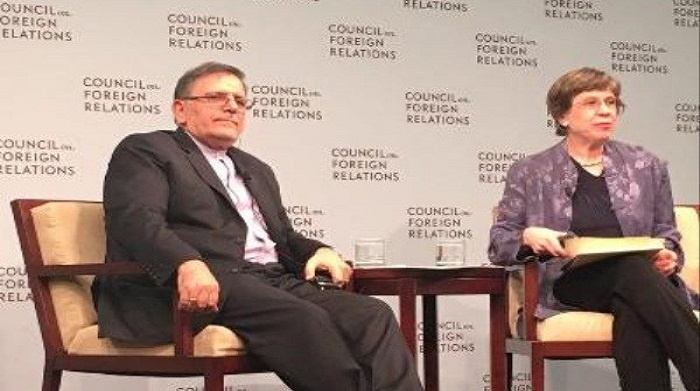Almost No Creativity

In an appearance April 15 at the Council on Foreign Relations, Seif said Iran had not seen the results it expected after implementation of the JCPOA. “In general, we are not able to use our frozen funds abroad.” He called for more “serious efforts” by the US government to fulfill its commitments to help Iran re-enter the global financial system. “They have not honored their obligations,” Seif said.
Iran expects Washington to reinstitute limited access to the US dollar, the so-called U-turn, to facilitate the Islamic Republic’s financial transactions with the rest of the world and fully implement the Joint Comprehensive Plan of Action (JCPOA), Seif he was quoted as saying by Al-Monitor on Friday, during his official visit to the US.
The U-turn is a customary process when currencies such as the Indian rupee are converted into euros as the dollar is used in pricing the conversion. Iran would like to employ the U-turn to gain easier access to some $100 billion in foreign reserves that had been frozen in Asian banks prior to the JCPOA.
US officials, including Treasury Secretary Jack Lew — with whom Seif met on April 14 — have ruled out reinstituting the U-turn for Iran even though the procedure was allowed from 1995, when the United States ended direct banking relations with Iran and imposed a wide trade embargo, until 2008.
The U-turns have turned into a political controversy in the US as there are several bills in Congress that would outlaw the return of the procedure for Iran. The Obama administration will have to resolve the issue during an election year while Congress’ Republicans are splitting hairs about Iran’s moves outside the JCPOA, including among others Iran’s testing of ballistic missiles and support for the Bashar al-Assad regime in Syria. However, Iran’s principlist radicals are also making the best of the bad bargain, to press the Rouhani administration which is in a relatively similar position to that of Obama’s given next year’s presidential race in Iran.
Kayhan, VatanEmrouz and Javan, three of the most prominent principlist daily tribunes of the far-right principlist camp have featured Seif’s remarks emboldening “almost nothing” on their front pages using the same photo. Like-minded news agencies Tasnim and Fars did not let themselves fall behind either. “The shining sun of the JCPOA sets before it even rose,” Kayhan wrote. To say the least, this comes up as a counterproof for their repeated accusation that pro-reform papers in Iran work in a chain, with implicitly alleged links with the country’s ardent enemies in the West. Furthermore, the hardliners are blaming Rouhani’s team of foreign policy for a deal which has been nationally endorsed and invested upon after a consensus formed in higher places inside the establishment. Frustrated with the Rouhani administration’s relative success in foreign policy and harnessing inflation after a period of unprecedented skyrocketing prices, and in fear of the President’s reelection, they have taken an attitude and tone resembling those dubbed as ‘traffickers of the sanctions’, the main beneficiaries of the current economic isolation of the country who have obtained enormous easy profits due to the supervisory void and economic rents created under the sanctions.
Such propaganda are losing ground as Iranians become increasingly aware of the risks lodged in a potential return to the pre-deal era. However, this does not mean that the Rouhani administration, campaigned as ‘the government of prudence and hope’, has much time. It has already wasted too much public trust due to uncoordinated and at times unverified comments made by its own members. On the other hand, with populism and hypocrisy still in the air as a means justified by higher goals for the principlists, continued high unemployment rates, low purchasing power and a long-time stagnation strangling the country’s economy will push many less-informed individuals leaning toward sugar-candy promises made by principlist presidential hopefuls and weaken the social base reformists and moderates have established by the sweat of their brows, just lionized after victories in the recent parliamentary elections.
For now, a moderate Iran is better at serving its own people and coming to terms with the world community. Further delays in reconnecting Iran with global trade systems and giving it rightful access to its frozen assets could mean a collapse not only in mutual trust but also in the Rouhani administration’s social base.

